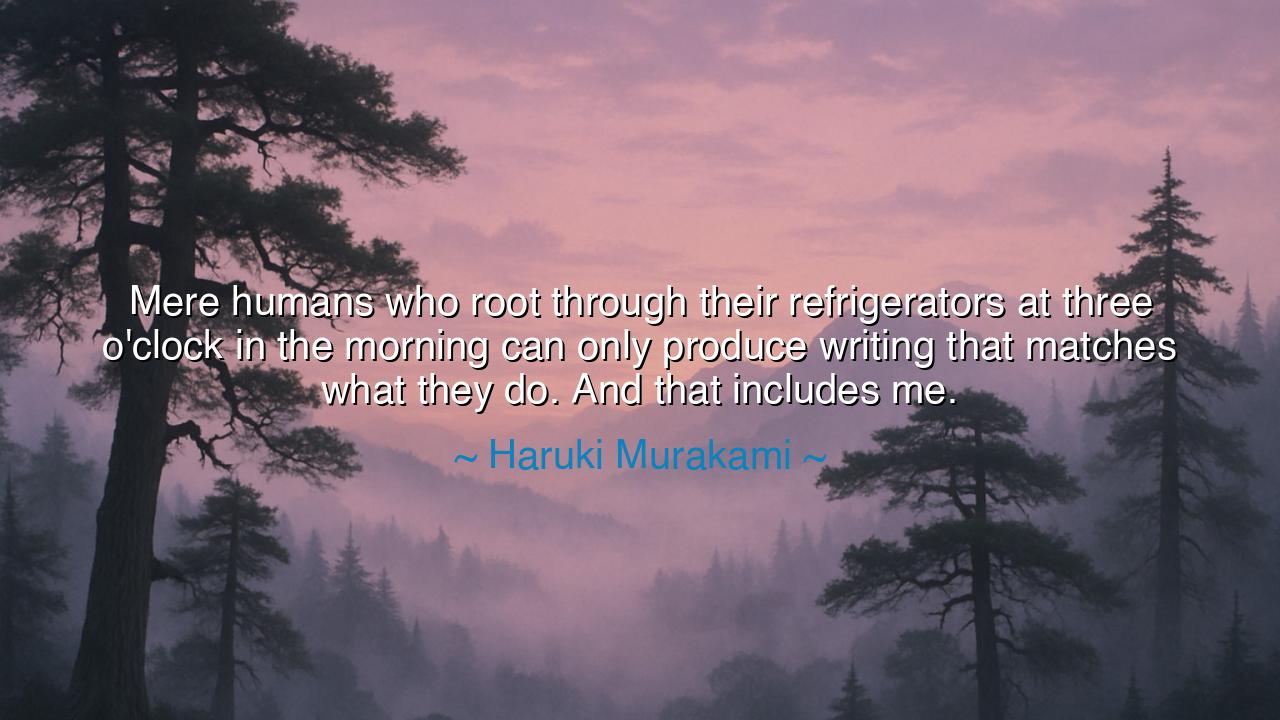
Mere humans who root through their refrigerators at three
Mere humans who root through their refrigerators at three o'clock in the morning can only produce writing that matches what they do. And that includes me.






"Mere humans who root through their refrigerators at three o’clock in the morning can only produce writing that matches what they do. And that includes me." Thus spoke Haruki Murakami, the dream-walker among writers, whose tales drift between the ordinary and the surreal. These words, though wrapped in the image of midnight hunger, are not merely about food, nor about the act of writing—they are about discipline, about the bond between the life one lives and the work one creates. For Murakami reveals here that the quality of creation cannot be separated from the rhythm of existence. As a man lives, so too will he write.
To root through the refrigerator at three in the morning is to live in disorder, to surrender to restlessness and impulse. It is the picture of one whose mind wanders without anchor, who seeks comfort in odd hours rather than strength in steady ones. Murakami, who is known for his near-monastic devotion to routine—waking before dawn, running long distances, writing for hours—reminds us that a creator’s craft mirrors their habits. A disordered life yields disordered work. A steady life yields prose of clarity and depth. Thus he admits with humility: even he, if he falters, will produce only what his faltering deserves.
History shows us the same truth. Consider the philosopher Seneca, who warned that wasted hours are the costliest of all possessions. He observed that men rise late, drift into distractions, and then wonder why their lives lack substance. Just as the body fed on scraps at midnight becomes sluggish, the mind fed on erratic habits produces weak thought. In contrast, look to Benjamin Franklin, who declared, “Early to bed and early to rise, makes a man healthy, wealthy, and wise.” Franklin’s writings, inventions, and statesmanship were not born of midnight chaos, but of ritual, order, and the careful governance of time.
Murakami’s image is humorous, yet it pierces with wisdom. The refrigerator at 3 A.M. is not only the literal fridge—it is the symbol of our temptations, our restless hungers, our escapes into comfort when we ought to be grounded in discipline. Each of us has such a “fridge” we sneak to in the night: it may be procrastination, distraction, indulgence. And what we take from it, what we feed ourselves with in those hidden hours, will manifest in the works we produce, in the lives we build.
But let us not despise our humanness. Murakami himself admits: “And that includes me.” Even the wise falter. Even the disciplined hunger at odd hours. The lesson is not to demand perfection, but to recognize the link between life and art, between routine and creation. The sage is not the one who never stumbles, but the one who, knowing he stumbles, returns each day to the path of balance.
So what must we do? First, we must honor the discipline of rhythm. Rise with the dawn, not the midnight lamp. Nourish the body and the mind with steady practices—whether it be reading, exercise, meditation, or writing. Second, we must recognize that what we create in the outer world is born from the inner one. If your days are chaotic, seek harmony; if your nights are restless, seek stillness. The fruits of your labor will reflect the soil in which they grow.
Practical action is clear: build your mornings with strength, not haste. Set rituals that anchor you—like Murakami’s daily run or Franklin’s morning plan. And when you find yourself wandering to the fridge of distraction, do not despise yourself, but laugh as Murakami laughs, and return to your path with greater resolve.
Thus the teaching is this: live as you wish to write, and write as you strive to live. For no art, no deed, no word can rise higher than the life from which it springs. And if you would craft work of beauty, of weight, of endurance, then let your life itself become such a work.






AAdministratorAdministrator
Welcome, honored guests. Please leave a comment, we will respond soon